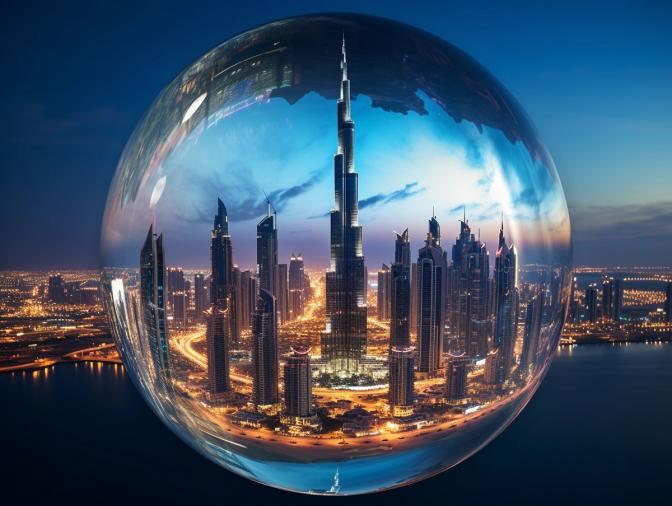Последние несколько лет в Дубае наметилась порочная, параболическая тенденция, вызывающая восторг у одних и беспокойство у других. Как агент, я должен верить в свой продукт. В последнее время все чаще раздаются критические голоса в адрес Дубая и его рынка недвижимости. Поэтому я решил проверить реальность. А что может быть лучше для организованного изложения своих мыслей, чем писать?
Считаю ли я, что Дубай слишком переоценен? На этот вопрос я попытаюсь ответить и себе, и вам. И начну я с того, с чего начались мои собственные сомнения.
Эта статья для вас, если вы в глубине своей души уже решили, что хотите купить недвижимость в Дубае, но не уверены, что наступил подходящий момент.
Если вы только начинаете свое исследование или случайно наткнулись на эту статью, лучше сэкономьте свое время и пропустите ее (тем более что она довольно длинная и сухая).
Несколько месяцев назад (возможно, больше шести, но меньше девяти) один из моих коллег в компании, в которой я работал, сказал: "Я бы никогда ничего не купил в офф-плане!". Это заявление меня поразило, поскольку мы оба занимались исключительно "офф-планом", и у него даже продажи шли запредельно хорошо. Тогда я не придал этому значения, но зерно было заложено, и каждый раз, когда я сталкивался с какой-то ерундой, происходящей на рынке, у меня возникали сомнения: насколько хуже может стать, прежде чем это обрушится на нас?
Прошло некоторое время, и ко мне обратился клиент по поводу таунхауса от компании Damac в общине, которая вышла на рынок чуть более двух лет назад (на момент разговора с ним). Он ждал снижения цен и надеялся, что я смогу помочь ему уложиться в бюджет. Он назвал мне цену, за которую готов купить, которая, как я помню, была чуть выше цены запуска. Я проверил несколько порталов и просмотрел несколько частных групп WhatsApp в поиске заявок на этот проект и быстро понял, что цена, по сути, выросла почти вдвое. Когда я сообщил ему о своих выводах и о том, что дефицит слишком велик, чтобы что-то предпринять, он согласился и сказал, что предпочел бы подождать. Уверенность, которую он демонстрировал, заставила меня поверить, что он знает, что делает, и что рынок, возможно, перекуплен.
Еще через какое-то время я обнаружил комментарий, написанный моим другом в дискуссии на Facebook об инвестициях в недвижимость за границей. Он руководит большим сообществом экспатов, добился огромного успеха во многих бизнесах и является блестящим, независимым мыслителем, не боящимся говорить возмутительные вещи наперекор толпе. Его комментарий был столь же кратким, сколь и категоричным: "Дубай слишком переоценен".
Мое лицо побледнело.
Сигнал и шум
Все! Я наконец-то ударил кулаком по столу. Как я мог так запутаться в продукте, который продавал? Пришло время изучить все мнения и переоценить реальный мир.
Источник шума
Когда я встречаю людей, владеющих недвижимостью в Дубае, они в крайней степени довольны. Может быть, это просто мой социальный пузырь, но чаще всего я встречаю сопротивление со стороны людей, которые еще не владеют недвижимостью в Дубае или совершили неудачную покупку и теперь чувствуют необходимость громко предупредить всех остальных об этом "мошенничестве", делая это на Facebook или других интернет-форумах.
Вот популярная дискуссия на Reddit. Автор и некоторые комментаторы, похоже, убеждены, что цены на недвижимость в Дубае завышены и рынок должен упасть. Автор даже предсказал, что обвал (он говорит о не более чем 30%) произойдет к "концу третьего квартала этого года [2023]".
Сейчас мы уже довольно близки к этой дате, и с тех пор цены по всему Дубаю выросли как минимум на 10% (на рынке незавершенного строительства - скорее на 15%).
Вот еще несколько фрагментов из этого обсуждения:
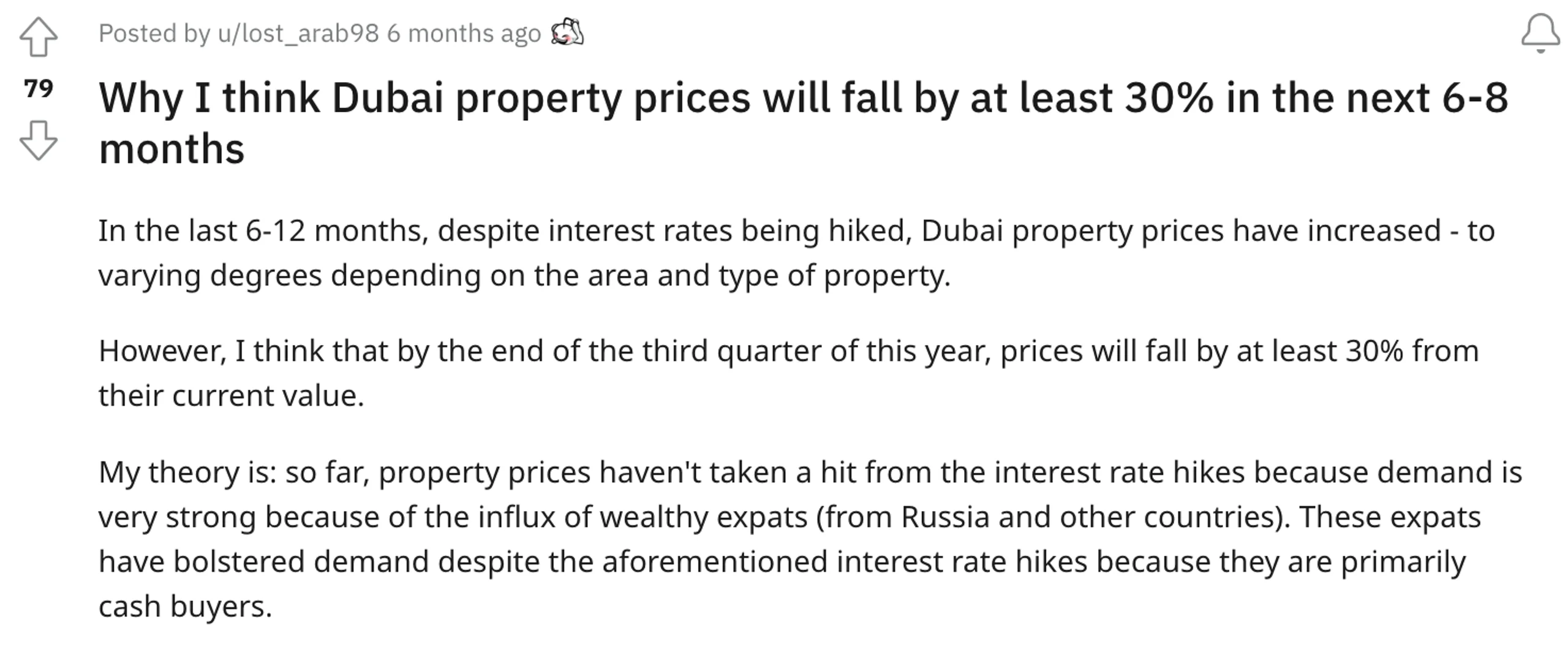



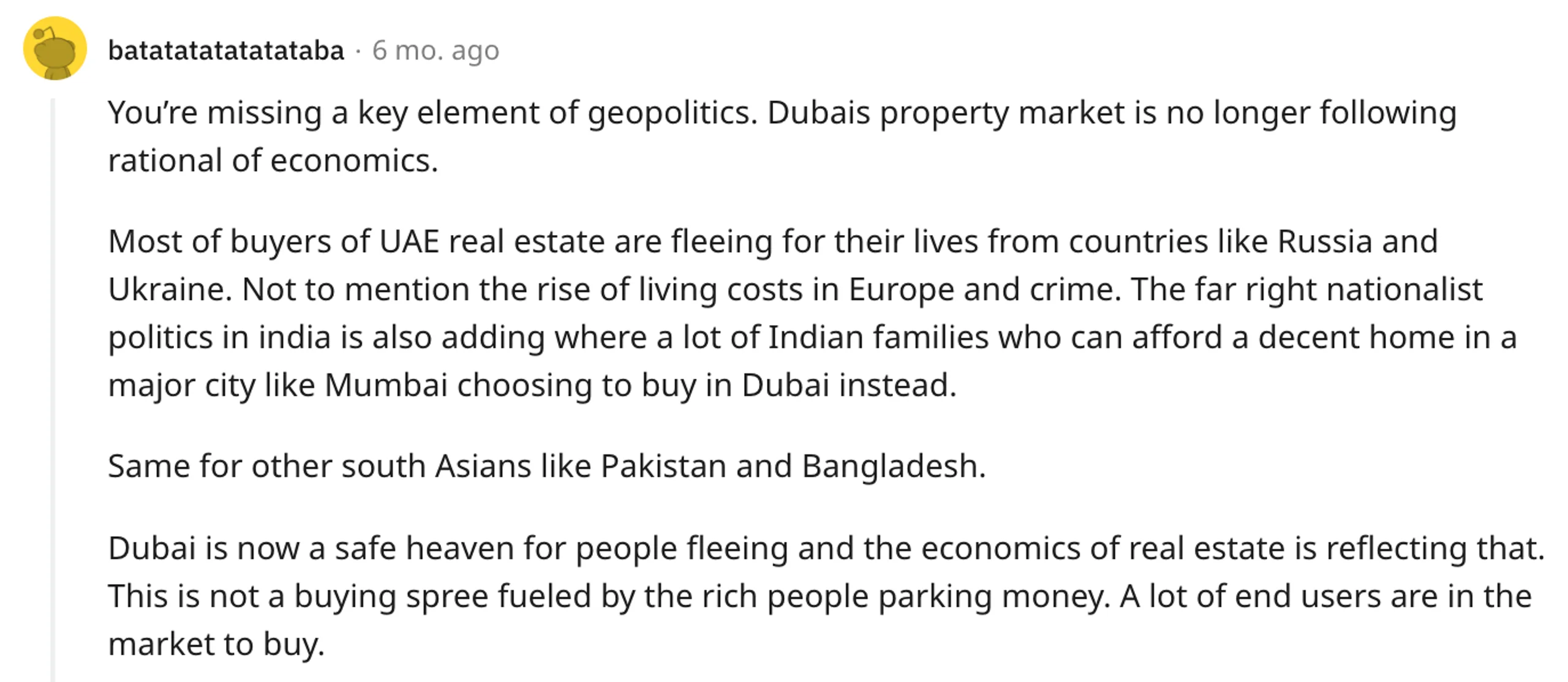
Машина пропаганды Дубая
Дубай произвел фурор. В последние несколько месяцев его можно услышать повсюду. Рэперы снимают свои клипы в Дубае и включают его в тексты своих песен. Подкасты снимаются в Дубае, и город всегда упоминается в том или ином контексте (в большинстве случаев, однако, в положительном). Здесь снимаются сериалы и фильмы. Это город будущего, город технологий, бизнеса, возможностей и роскоши.
Вы можете почувствовать, что что-то назревает. И если уж на то пошло, то Дубай, скорее всего, вскоре взорвется.
Конечно, в ответ на этот хайп было много критики, но независимо от того, оправдана она или нет, можно сказать, что одна сторона сильно преобладает над другой. Предположим, что вы просто надели шляпу инвестора и не судите о морали. В этом случае вам ничего не остается, как признать, что Дубай удачно преподносится как крайне привлекательный город (а поскольку судить об этом, в конечном счете, должен сам человек, позвольте мне сказать вам, что бесчисленное множество людей, живущих здесь, на самом деле тоже так считают. Даже те, от кого вы не ожидали такой любви к Дубаю).
Я не говорю, что нужно отвергать мораль. Я знаю, что в Дубае многое идет не так, но так происходит и в большинстве других мест мира. Поднимать указательный палец и утверждать, что в Европе все гораздо лучше с точки зрения экологии или прав человека, - это не является моей работой, к тому же я искренне так не считаю. Лицемерие можно найти везде, и хотя Дубай, конечно, не свободен от вины, я не могу сказать, что здесь лучше или хуже, чем в других местах. Поэтому я не вмешиваю свои эмоции и смотрю на ситуацию только с экономической и финансовой перспективы.
О качестве жизни в Дубае
Когда речь идет о выборе места жительства для вас и вашей семьи или даже о том, где вы хотите провести свой следующий отпуск, качество жизни является одним из самых решающих факторов.
Исходя из этого наивного, но закономерного понимания, у меня возникает простой вопрос: насколько желательно жить (или проводить время) в Дубае?
Начиная с данных, я хотел бы привести два индекса жизнеспособности. Первый - это ежегодно публикуемый Economist Intelligence "Global Liveability Index 2023", который оценивает 173 города (Вена - на первом месте, Дамаск - на 173-м, Дубай - на 76-м). Это не очень хорошо, но и не слишком плохо. Живя здесь, я понимаю, почему он не находится дальше в рейтинге. Есть такие проблемы, как вездесущие стройки, неудовлетворительное качество воздуха, нескончаемое обжигающее солнце и другие.
Другой онлайновый индекс комфортности жизни рисует иную картину, чем индекс Economists. Здесь мы имеем 193 города, во главе которых стоит Гаага, заканчивает список Манила, а Дубай занимает 26-е место.
Из этих рейтингов я делаю вывод, что среднее качество жизни объективно именно таково: среднее (что может показаться хуже, чем есть на самом деле, поскольку слово "средний" здесь используется скорее в статистическом контексте, чем в качественном). Очевидно, что при достаточном количестве денег и гостеприимстве Дубай вполне может обеспечить элитный образ жизни. Однако следует признать, что на самом деле даже в Дубае большинство составляют обычные в финансовом отношении люди, которые будут жить в большинстве стандартных объектов недвижимости. Кроме того, при наличии достаточных финансовых средств можно наслаждаться отличной жизнью везде, в любом случае.
Логично предположить, что уровень жизни в данном случае не является достаточно сильной причиной, чтобы исключительно привлекать (или, наоборот, отталкивать) большинство людей.
При этом у меня были разные личные встречи с людьми, когда я был поражен тем, насколько им нравится жизнь здесь.
Например, однажды я встретился с клиенткой - известной дизайнершей интерьеров из Лас-Вегаса. Она приехала в Дубай на короткое время для участия в архитектурной конференции и планировала расширить свой бизнес. Она рассказала мне, что влюбилась в город и стиль жизни, продлила свое пребывание еще на две недели и незамедлительно купила две квартиры. Когда я позже связался с ней, чтобы узнать, как складывается жизнь в Лас-Вегасе, она рассмеялась: "Кто сказал, что я вернулась?".
Я столкнулся со своим другом-экспатом, который написал в Facebook комментарий о том, что Дубай слишком преувеличен. Я спросил его, что именно он имел в виду, и он ответил, что просто имел в виду цены на недвижимость. Как место для жизни он ему очень нравится (я это далее не буду комментировать).
В заключение следует сказать, что качество жизни и его перспективы - это относительная метрика. Если в одном городе уровень жизни лучше, то в других он должен быть хуже. С этой точки зрения города Европы и США, которые в настоящее время по-прежнему лидируют в индексах, стремительно ухудшаются. Дубай же, в отличие от них, неуклонно улучшает свои показатели и ползет вверх.
Предложение и спрос
Ничто другое не определяет цену так сильно, как спрос и предложение. Это основа всех экономических вопросов, которую мы должны были изучать в школе и колледже. Так как же это работает?
Определить это сложнее, чем может показаться. Нам не хватает соответствующих и свежих данных, поскольку под спросом понимается не просто закрытые сделки: Это желание, готовность и способность потребителей заплатить определенную цену за продукт.
Вы можете быть уверены, что огромное количество людей тихо ожидает более значительного отката, чтобы войти в рынок по более низкой цене. Эта группа со своими индивидуальными ценовыми ожиданиями нигде не зафиксирована. В конечном счете, все мы хотим, чтобы рынок рос, но некоторые надеются на лучшую цену входа. Они пытаются идеально рассчитать время входа и теоретического выхода (как показывает практика, сделать это практически невозможно, а надежда - довольно паршивая инвестиционная стратегия).
Поскольку не существует набора данных, отражающих истинный спрос, я хочу сделать вывод о нем с гибридной перспективы. Мы рассмотрим данные о росте населения и количестве туристов, ежегодно приезжающих в Дубай. Затем я расскажу вам о ежедневных разговорах, с которыми я как риэлтор сталкиваюсь с клиентами и коллегами.
First, here are some marks of the population since 2015 (you can check those numbers yourself on the Dubai Statistics Center by the government):
Для начала приведем некоторые показатели численности населения с 2015 года (эти цифры вы можете проверить самостоятельно на сайте правительства Dubai Statistics Center):
- 31 декабря 2015: 2 447 351
- 31 декабря 2016: 2 699 355 (+252 004 / +10,29%)
- 31 декабря 2017: 2,977,028 (+277,673 / +10,28%)
- 31 декабря 2018: 3,192,848 (+215,820 / +7,24%)
- 31 декабря 2019: 3 356 267 (+163 419 / +5,11%)
- 31 декабря 2020: 3 411 341 (+55 074 / +1,64%)
- 31 декабря 2021: 3 478 496 (+67 155 / +1,96%)
- 31 декабря 2022: 3 550 186 (+71 690 / +2,06%)
- 10 сентября 2023 (дата написания этой статьи, до конца года осталось более 3 месяцев): 3,622,359 (+72,173 / +2,03%)
Тенденция совершенно очевидна. Растет не только Дубай, но и темп его роста.
Отсюда же посмотрим на количество туристов, ежегодно посещающих Дубай и также нуждающихся в размещении (а поскольку в зимний и летний сезон Дубай сильно различается, проверим по кварталам).
Информация по-прежнему доступна в Dubai Statistics Center.
- Q1 2018: 4,650,000
- Q2 2018: 3450000 8,100,000
- Q3 2018: 3480000 11,580,000
- Q4 2018: 15,920,000
- Итого 2018: 15,920,000
- Q1 2019: 4,750,000
- Q2 2019: 8,360,000
- Q3 2019: 12,080,000
- Q4 2019: 16,730,000
- Итого 2019: 41,920,000
- Q1 2020: данные отсутствуют
- Q2 2020: данные отсутствуют
- Q3 2020: данные отсутствуют
- Q4 2020: данные отсутствуют
- Итого 2020: 5,510,000
- Q1 2021: 1,270,000
- Q2 2021: 2,500,000
- Q3 2021: 3,850,000
- Q4 2021: 7,280,000
- Итого 2021: 14,900,000
- Q1 2022: 3,970,000
- Q2 2022: 7,120,000
- Q3 2022: 10,120,000
- Q4 2022: 14,360,000
- Итого 2022: 35,570,000
- Q1 2023: 4,670,000
- Q2 2023: 8,550,000
- Q3 2023: TBD
- Q4 2023 TBD
2020 и 2021 трудно оценить из-за пандемии, а 2023 год еще не закончился (хотя он кажется очень похожим на 2019 год). Поэтому за точку отсчета возьмем самый слабый из самых сильных кварталов (четвертый квартал 2022 года с 14,360,000 туристов), так как требуется принять максимальное количество туристов (а с точки зрения выгодного инвестирования сезон способен сделать прибыльным весь год, о чем рассказал в интервью один из хозяев Airbnb).
According to Statista, the average stay of Americans in Dubai ranged from 5.9 to 7.5 days. We will take the shorter duration and assume that, on average, 2.5 people share one unit to be somewhat conservative. That creates a demand for 14,360,000 / 2.5 * 5.9 / 90 (days in one quarter) = 376,551 accommodations in Q4 2022.
This is a naive calculation to give us a basic idea of what we are dealing with on paper. You can adjust the numbers if you believe them to be different.
With these numbers, we can gauge the demand and understand the trajectory. Again, the numbers for tourism are difficult to interpret due to COVID. Suppose the industry will return to pre-pandemic numbers (there is really no reason why not). In that case, you can add at least 5 million tourists annually to the picture.
From here, let's look at the supply side of things.
According to the Dubai Statistics Center, there were 807,359 total housing units at the end of 2022, of which 804 are hotel buildings (but only 610 operating). Those hotels offered 120,602 rooms in total (leaving Dubai with 686,757 residential units). Also, that means 14.9% of all properties in Dubai are hotel units.
That's 197.7 rooms per hotel on average. For example, the Burj Al Arab has 205 rooms, and the JW Marriott Marquis Dubai has the most rooms in Dubai, counting 1,608 (source: Wikipedia).
Additionally, there were 15,984 Airbnbs listed in June 2022. Starting with the demand for tourism housing, we determined a need for 376,551 units at the peak. But Dubai only has 120,602 + 15,984 = 136,586 units for short-term to offer.
It's easy to assume that there is a massive supply shortage (less than 50% of the demand being met), but I have a reasonable explanation:
The Dubai Statistics Center defined tourists as non-residential individuals who stay at least one day and land in one of Dubai's airports. However, it is unknown where they go from there. Many probably go to Sharjah, Ajman, Ras Al Khaimah, Abu Dhabi, or elsewhere, not staying in Dubai. Many may also visit friends and live at their places. Some tourists will be non-residents who own a vacation property without being registered as residents.
Still, just from looking at the macabre price surges for short-term stays in the high season, it's common sense to assume that demand is covered, but barely so (if the prices go any lower, demand wouldn't be covered). Time has yet to prove it, but it seems that Dubai is only picking back up on tourism.
We know that 686,757 residential properties were needed to accommodate 3,550,186 people at the end of 2022, which means there are 0.19 properties available for every Dubai resident.
For context, here is how the supply has developed over the past few years, according to DxbInteract. The following is the amount of actually delivered units in a respective year:
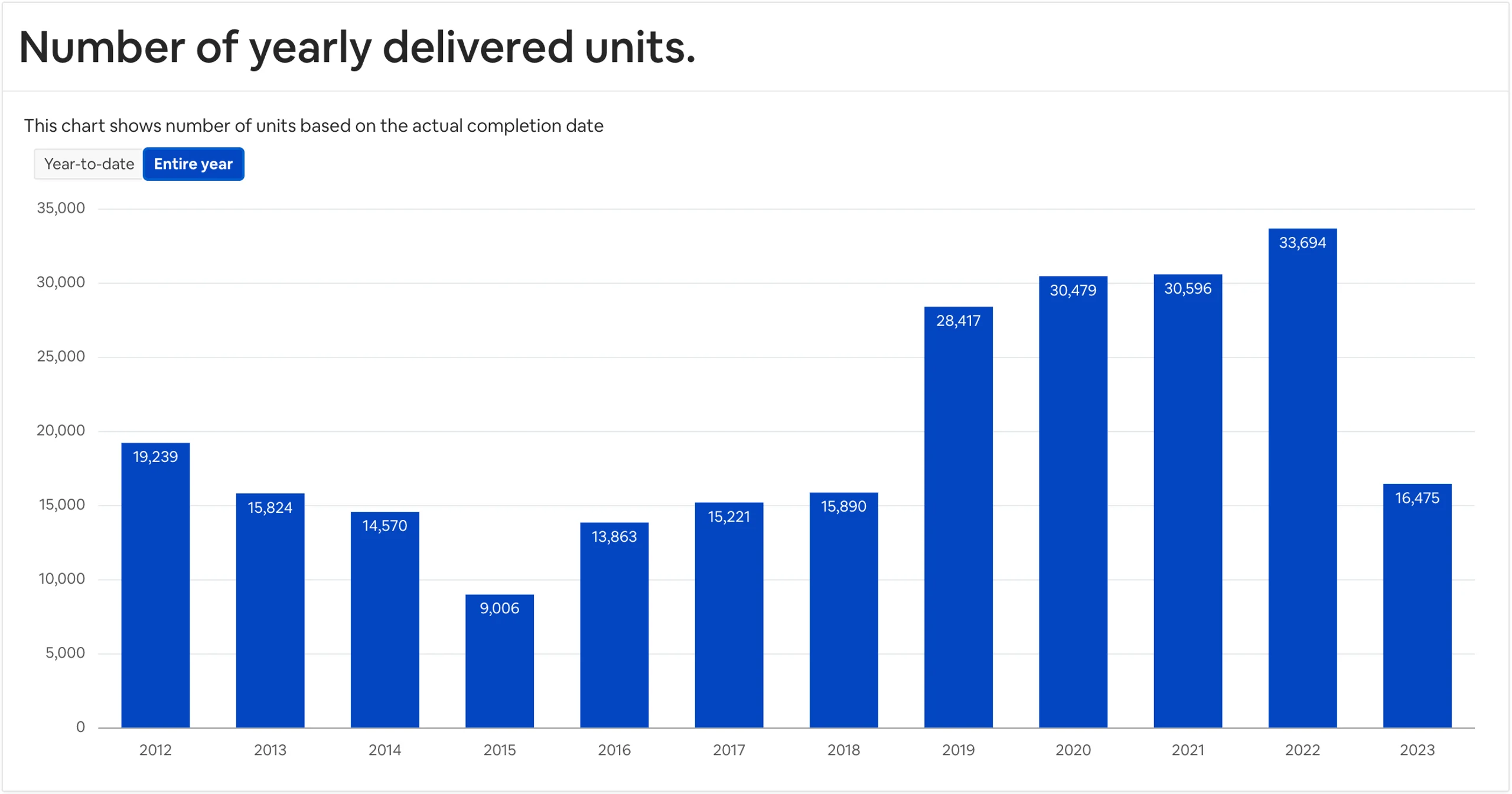
- 2016: 7,307 properties delivered (0.03 units / new resident)
- 2017: 8,902 properties delivered (0.03 units / new resident)
- 2018: 9,668 properties delivered (0.045 units / new resident)
- 2019: 20,273 properties delivered (0.124 units / new resident)
- 2020: 19,078 properties delivered (0.346 units / new resident)
- 2021: 21,775 properties delivered (0,324 units / new resident)
- 2022: 19,078 properties delivered (0,266 units / new resident)
- 2023 (state at the time of writing, September 10th, 2023): 16,475 properties delivered (0,228 units / new resident)
As you can see, Dubai has been adding very few homes per new resident before 2020, and it is probably safe to assume that there was a massive supply shortage. Since 2020, it has scaled up to almost one property per two new residents.
Now let's pull in the last piece of information: The future supply.
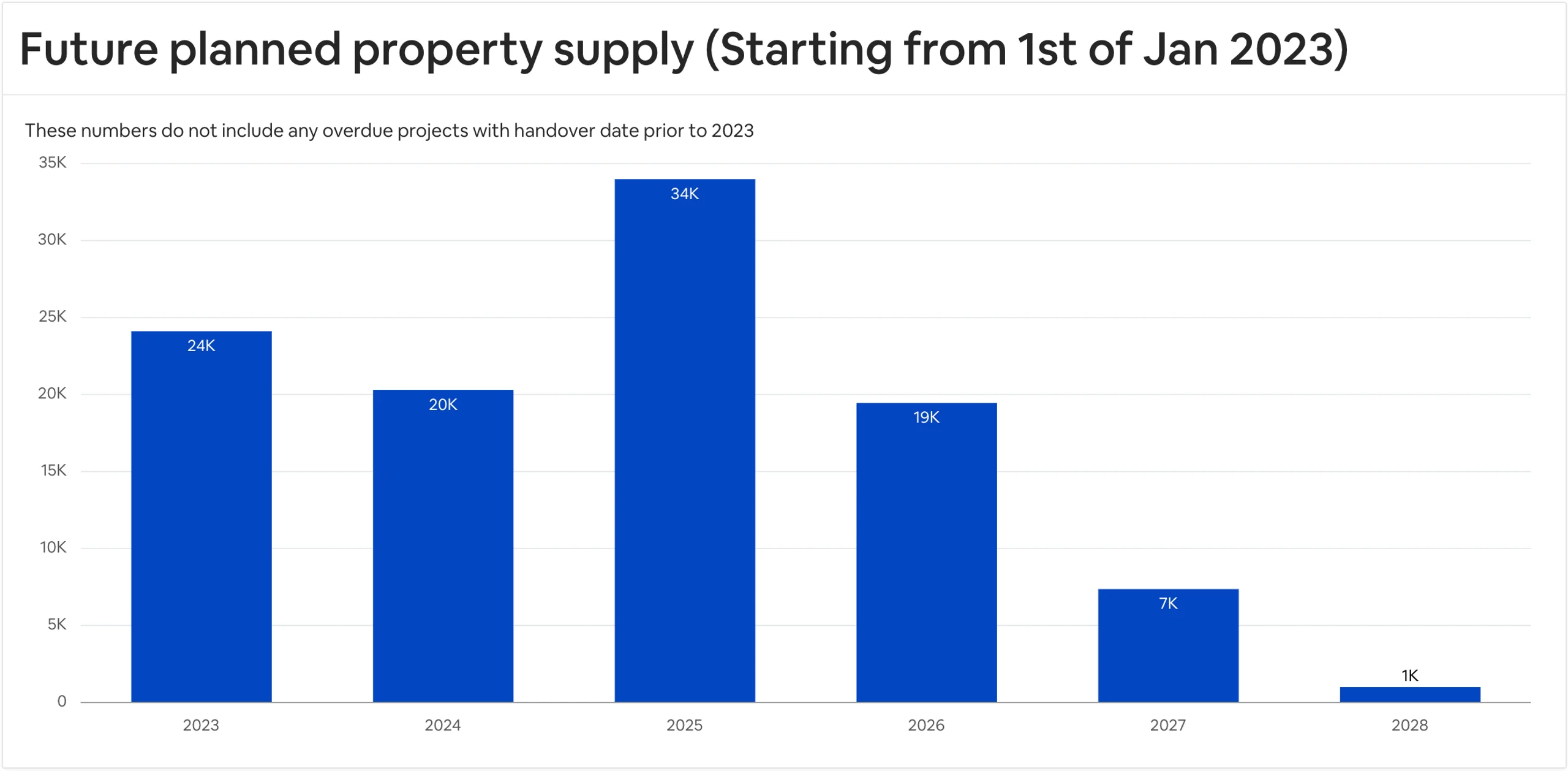
Starting with the current year and in the future years, the following amounts of properties are scheduled to be finished (actual completion may differ, more likely delayed than premature):
- 2023: 24,110 properties (16,475 already delivered)
- 2024: 20,300 properties
- 2025: 33,990 properties
- 2026: 19,460 properties
- 2027: 7,369 properties
2023 and 2024 have relatively few homes coming up, only for 2025 to make a considerable jump up and potenti
Note: Most properties (and certainly in good projects) scheduled for 2023, 2024, and even 2025 are largely sold out by now. Also, any project to be completed in 2025 has likely been launched by now (it takes around two years for most projects to finish). So, some new projects will mostly add to 2026 and beyond, but many projects have been launched that are planned to meet even those years.
I will extrapolate the numbers linearly for more accurate, comprehensible, and realistic calculations. Since we have 72,173 new residents for the year on September 10th, 2023, there are 112 days left (112 / 365 = 30.7%). If everything stays the same, Dubai will have grown by 102,664 people to 3,652,850 total (+2.89%) at the end of the year.
The above extrapolation is still conservative and, at the very least, highly likely the minimum growth. Like the influx of tourists, the number of new residents is always the highest in the third and fourth quarter of a year.
So, let's say there is no significant change in the growth rate, at 2.89%, that would propel the population of Dubai to 3,652,850 * 1.0289 = 3,758,417 (+105,567) in 2024. Applying the 14.9% rate of hotel units to the 20,300 upcoming estates, we're left with 17,275 residential properties. That means 105,567 people would have to fill up 17,275 homes (0.16 homes per person). Following up with this calculation for future years (we'll stop at 2026 because the further we look, the less accurate our knowledge of supply becomes, as new projects are more likely to be announced still):
- 2025: +2.89% assumed population growth. 3,867,035 total, +108,618 people. 33,990 properties planned so far, resulting in 0.31 homes for every new resident
- 2026: +2.89% assumed population growth. 3,978,792 total, +111,757 people. 19,460 properties planned so far, resulting in 0.17 homes for every new resident
Comparing these numbers with the number of new homes per new resident before 2024, the supply is running into a shortage again.
Since the population growth rate in 2023 will probably be significantly higher than the linearly extrapolated 2.89%, you should expect the market to go even higher, even faster. Most new project launches name 2026 as the completion year, which leads me to believe that 2025 won't have significantly more properties delivered than currently anticipated, so demand will surge even more in the next two years.
Dubai has a growth plan until 2040. Among other milestones, it's planned to hit 5.8 million residents by 2040. To achieve that, Dubai needs to grow by an average of 2.71%
One thought I have is that most newly finished properties nowadays are filled with amenities and will likely be used by wealthier people. You can interpret this positively or negatively (purely from the investment perspective):
- This may lead to a further price surge because most financially well-established people will not need to share the property to save costs, potentially driving the average of available properties per person even further down. That would definitely result in overall higher prices.
- Understanding that not everybody moving to Dubai is rich, it may cause price fluctuations across market segments. With too many premium properties for too few people who can afford them, prices for new and high-end properties could decline. In contrast, prices for older, lower-end properties might experience a slim price increase.
To be able to put this into context and judge appropriately, we should look at how this played out in the past:
In terms of deviations from the assumed 2.89% growth rate or the actual completion date of projects vs. the assumed, anything that results in a higher demand / lower supply (e.g., more population or less completed projects) will most certainly lead to a significant price surge. In contrast, lower demand / higher supply won't necessarily lead to a noticeable price correction.
The reason I am saying this is because developers and homeowners will take any opportunity to raise prices immediately, while they may be hesitant to sell
Finally, theory and numbers are all good and essential, but I want to provide an insight into the real-life experience of how the supply vs. demand issue feels to an industry professional (or just to someone who lives in Dubai and pays attention to what is going in the real estate market).
Firstly, you get to know a lot of supremely successful realtors. You hear from them how clients are buying ridiculous properties left and right. They are sensing an immense interest from people.
It also shows in the speed at which some projects sell out. For example, Coral Reef by Damac sold out within 6 hours for a total value of $180m. Danube has launched a sequel of three identical towers, Elitz 1, Elitz 2, and Elitz 3, in different locations. They did that because people loved the project so much. Elitz 2 sold out within 15 days (studios were gone after one day). And there are more examples like that. Sometimes, it feels like the first iPhone launch, where people line up hours before the sales office opens to secure their unit, except that the product costs $150k upwards instead of $1k.
Especially in the high season, the city is filled with people. Starting in September, Dubai turns into what feels like an overrun amusement park. Of course, that also creates problems, for example the traffic. But at the same time, you get to see the demand visually, which is an impressive and tangible sight for investors. See below:
Case Studies of Success
Nothing matters if you can't prove people are eventually getting the results they're looking for.
I have been to a few events and talked to people. Mostly, they were happy with how their property investments were developing, if they had any. Occasionally, someone would say, "they would have done it differently if they knew better at the time". Nevertheless, I have not once talked to someone face-to-face who said they had made a straight-up bad deal. At worst, the bottom line was that they could have made a better one. Clients who have bought properties before regularly say they "couldn't be happier" (literally).
A friend of mine is extraordinarily wealthy and probably has over 40 properties scattered around a few countries. Still, his favorite place to buy is Dubai (he also lives here). He did make one unfortunate purchase, but that's clearly an exception in his portfolio. Most of his properties he is holding in anticipation of even higher offers, or rents them out with ungodly ROIs.
Another prime example of success is big investors. I know of internal memos that many real estate brokerage owners keep buying dozens of apartments. They focus on different areas and property types at a time, aggressively scooping up real estate (for example, one of the biggest investors of the palm is currently buying many 1-bedrooms in Downtown). They use their agencies to source the best offers and buy through their own agents.
Crash scenarios
I needed to develop at least one theory of how a crash may play out. Otherwise, how can I take my own conclusion seriously, being so one-sided?
1. Russians pulling out
Should Russians pull their money out of the market (for example, because the war ends and they want to bring it back to their country), it may cause a serious correction (especially if they do it all at once). This scenario does not require further explanation or analysis - we all understand that Russians hold a significant market share.
Personally, I don't think this is a realistic scenario. Neither will the war end anytime soon nor would most Russians pull out even if it ended. The war forced most of them to their own luck. Whenever I talk to Russians in Dubai, they tell me they love their life here much more than in Russia. They don't want to return because they have tasted life outside of Russia.
On another note, Russians haven't even been in the top 3 nationalities who buy real estate in Dubai. Those being Britains, Indians, and French (Britains being most consistent at the top).
2. Flippers artificially overinflating prices
The second scenario that might lead to a noticeable price drop (although I don't think it has enough power for an actual "crash", maybe up to 10% maximum of a price correction) is if flipping will be carried out to the extremes long enough.
Investors often make 30-60% profits within months by flipping off-plan properties (assuming they picked a good project that follows up with enough demand). The problem is that they do not add any value for the money they get, creating distress and imbalance in the market. They are somewhat the freeloaders in the market.
This may snap back at some point, but again, the scenario is not funded by any data or anything else tangible. It is merely an observation and a potential scenario that I can see playing out at some point from what I observe in the market.
Conclusion
I believe that the real estate market in Dubai is currently in a very healthy state.
I tried to infer a realistic crash scenario from the gathered data, but unless an unexpected major event causes people to flee the city, purely from a supply and demand perspective, I can not see the real estate market in Dubai pulling back whatsoever. Rising prices seem simply justified.
Most of the critical chatter is unfunded and not verifiable by any data. A certain group of investors bases their opinion solely on the price, assuming it is too expensive because of how they "feel" and want a better entry. In my opinion, this is an invalid approach and will only cause agony to investors hoping for better entries while prices will ruthlessly increase.


